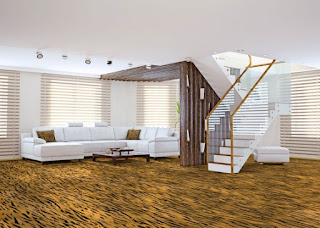Floor tile is a small segment of the flooring industry these days.
Unlike back in the 50's and 60's where everybody put tile down in their
kitchens, laundry rooms, bathrooms and basements most people these days
will install wood
flooring, ceramic tile, vinyl sheet flooring or even carpet depending upon the application.
Back
in the day, vinyl tile was used extensively. It came in a different
sizes such as: 6"x6", 9"x9" and 12"x12" tiles. Very common back then
were the 9"x9" tiles and were probably vinyl asbestos.
If
your home was built before 1980 and has the original floor tiles down
in any room of the house then they probably contain asbestos. Especially
if they were the 9"x9" variety. Most manufacturers stopped making vinyl
asbestos tiles in 1978 but some continued until probably 1980. Even
after that there was a lot of vinyl asbestos tile floating around in
stores back rooms until the stock was finally exhausted.
Vinyl
asbestos tile is not inherently dangerous. The asbestos was
encapsulated into the vinyl tile itself. It cannot be released into the
air (where it becomes a health risk when breathed in) unless something
causes it to be released. Anything that can abrasively wear the surface
of the vinyl asbestos tile can potentially release the harmful asbestos
particles into the air. Normal wear and tear shouldn't be a problem.
Never abrade the surface of a vinyl asbestos tile. Never clean it with
steel wool or sand it for any reason as this will release the fibers
into the air. Cleaning it with vinyl floor cleaners is fine and is the
preferred method of cleaning. Be careful even scraping the surface of
the tiles.
So if you do have vinyl asbestos tile in your home there really shouldn't be a health risk.
When
the time comes to install a new floor in the room containing vinyl
asbestos tile there are many options. Most companies, when they find
that vinyl asbestos tiles are present on the job, will refuse to do the
job until the tiles are removed. This has to do with the liabilities
associated with vinyl asbestos tiles. But this is an overblown reaction
to the situation. New flooring can be safely installed over vinyl
asbestos tiles without any health risks whatsoever.
One
option is to remove the asbestos tiles. This can be a very expensive
proposition when employing a certified asbestos removal company or using
a contractor that is asbestos certified.
Another
option is just to go over the existing asbestos flooring. If the tile is
installed on a concrete floor, such as you would find in a basement,
you would just need to skim coat the surface of the asbestos tile. There
are products out there designed to be applied to the surface of the
asbestos tile that will allow another floor to be glued down on top.
Covering the old asbestos tile is a safe and entirely satisfactory
solution.
If
you have asbestos tile on top of a wood substrate such as plywood, OSB
or any other suitable base layer then you can install a layer of luan
over the top and then the new flooring thereby sealing in the asbestos
tile underneath. The old tile needn't be removed.
So
there you have it. Vinyl asbestos tiles are not inherently dangerous and
shouldn't be a cause of concern. Whether you are installing a new floor
over the top or still using your current asbestos tile flooring, vinyl
asbestos flooring is a safe and durable floor that will last decades. On
the other hand, a new floor would look pretty good right about now,
eh? LOL
%2B160x118.jpg)
Jeff Dean
Dover Floor Covering
http://www.doverfloorcovering.com
%2B160x118.jpg)











%2B150x150.jpg)
%2B150x150.jpg)